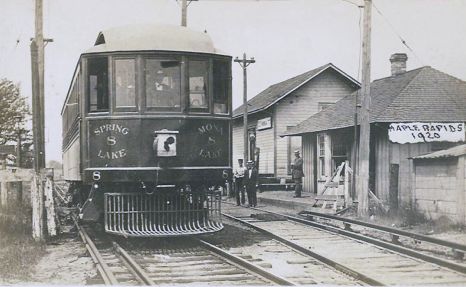- Details
- Hits: 2526
Railroad: Grand Rapids, Grand Haven and Muskegon Railway Company, The
The Grand Rapids, Grand Haven & Muskegon was organized in 1902 and built a line from Walker to Muskegon. Their trains used the Grand Rapids and Muskegon city lines to reach both downtowns. A branch line to Grand Haven was also built in 1902. All of these lines were abandoned in 1928. [MRL]
Built → Grand Rapids Grand Haven & Muskegon Railway → Abandoned
Built: 1902.
Operated for 26 years.
Became: Abandoned in 1928.
Reference: [MRRC]
 Notes
Notes
Controlled for a period by United Light & Power. This was an electric railway.
Photo Info: Grand Rapids, Grand Haven & Muskegon car #8, location unknown. The photo suggests Maple Rapids but we have been unable to identify this location. Note the cover over the arc headlight, which was used by the motorman to dim the headlight. [Alan Loftis collection].
Time Line
1902. SNAPSHOT. This line is both a trolley and third-rail system, with the trolley used when on or crossing a highway (about 4 miles of the 38 miles of system). Warning signs call attention to the third-rail system. Rail is 70 lbs. and laid on tie plates. The main power house is located at Fruitport, with sub-stations at Coopersville and Walkers. The shops are at Fruitport. Passenger and express cars are in first-class in their construction and are equipped with two 150-hp. motors; Westinghouse equipment with straight air brakes, with motor to supply air for air brakes; cars lighted and heated with electricity. The cars are supplied with smoking room, closet, water tank, signal lights, flags, torpedoes, signal whistle, sand box and telephones in the motorman's cab. Stations are located at different points along the line and are equal to the requirements of the public.
The road is divided into four section and there are four men to each section. Train order semaphore signals are provided at all stations where agents are located, the normal position of the semaphore being at danger. All trains must obtain a clearance card or semaphore signal at every station where they do not receive orders. This clearance card or semaphore signal will be information to the conductor and motormen that there are no train orders for their train at that station. Train orders are issued by the dispatcher for train movements not provided for by time table and are given by telephone or delivered by agents at stations. When taking a train order directly, the motormen use carbon sheets on a blank provided, writing the order as received from the dispatcher. The railroad uses the Grand Rapids City Electric Railway in Grand Rapids, and the Muskegon Electric Railway in Muskegon. The line from Grand Haven to Highland Park is operated during the summer season. [MCR-1903]
Bibliography
The following sources are utilized in this website. [SOURCE-YEAR-MMDD-PG]:
- [AAB| = All Aboard!, by Willis Dunbar, Eerdmans Publishing, Grand Rapids ©1969.
- [AAN] = Alpena Argus newspaper.
- [AARQJ] = American Association of Railroads Quiz Jr. pamphlet. © 1956
- [AATHA] = Ann Arbor Railroad Technical and Historical Association newsletter "The Double A"
- [AB] = Information provided at Michigan History Conference from Andrew Bailey, Port Huron, MI

